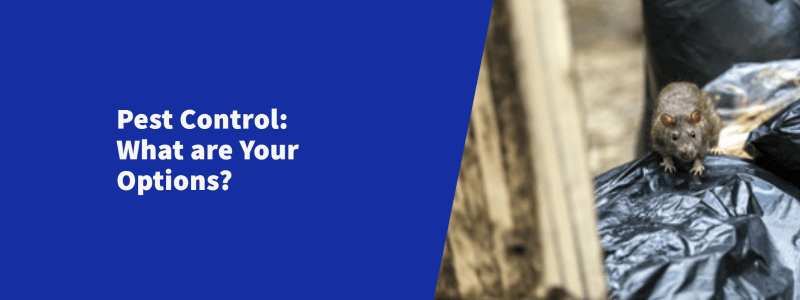As much as we’d love to embrace wildlife, pest problems are a fact of life. From restaurant districts to rental properties, many businesses simply can’t function with infestations.
In this article, we look into different types of “pests” and delve into the ways they can be managed, allowing you to make an informed decision on how to remedy pest problems in your workplace.
Rodents
Rats, mice, squirrels and other rodents commonly wreak havoc in all sorts of buildings and outdoor spaces.
Common fears of rodent infestations include:
- Spread of diseases
- Damage of property (e.g. chewed wires or pipes, leading to serious hazards)
- Food contamination
- Faeces
- Damage of business reputation
- Breeding (causing the problem to multiply)
- Aggression (e.g. biting)
For these reasons and more, business owners are legally bound to keep premises rat and mice free (under the Prevention of Damage by Pests Act 1949) and to report any infestations to the local authority.
Rodent Control
The initial aim of rodent control shouldn’t be to kill; the ideal goal is to promptly drive them towards a more suitable natural habitat for them to live without causing issues to businesses.
The best way to prevent an infestation occurring by eliminating the supplies that rodents thrive on. Without food, water, shelter and harbourage, rodents will seek somewhere else to inhabit. But once you have an infestation, this isn’t always possible.
The BPCA (British Pest Control Association) advise that you use a professional pest control company to deal with your problem. As you can see from the video above, pest control is a difficult thing to do as an individual, and often fruitless. Employing a professional team, such as Direct365, will ensure the problem is eradicated.
At Direct365, our intelligent pest management keeps up to date with innovative control methods, ensuring your business receives the quickest and most efficient service.
If you are inclined to deal with the issue yourself, you have a few choices. For quick rodent removal, your options include humane trap boxes, ultrasonic frequency repellents or non-toxic repellent liquids.
If do you feel the need to use traps or repellents, ensure this is done as a last resort once you have gone over this checklist:
- Remove all potential sources of stray food (like bird seed, animal feed, fruit and even snails and animal faeces)
- Store all commercial food in rodent-proof containers with secure lids
- Keep bins closed at all times with tightly fitted lids
- Repair leaking faucets, sprinklers or other piping
- Keep drain covers tightly fastened
- Eliminate unnecessary standing water
Birds
When is it time to call a bird a pest? Birds are everywhere and, usually, they don’t cause much issue. Birds become pests when they start to flock and nest in the wrong places, causing damage to buildings or crops, creating noise pollution, spreading disease and acting aggressively to the public.
The most common feral birds that cause these sorts of issues include:
- Pigeons
- Geese
- Seagulls
- Starlings
- Sparrows
- Collared doves
Bird Control
Most bird control solutions deter birds from landing, forcing flocks to find a more suitable place to nest. These types of preventative measures are predominantly safe and harmless and suitable for various sorts of businesses:
- Bird spikes
- Bird wire
- Netting
- Bird mesh
If these options don’t suit your business, there are plenty more niche solutions, including:
- Optical illusions – bird gel or other light reflecting deterrents create an illusion of fire to scare birds away
- Falconry – a more extreme option for large open spaces where birds are otherwise impossible to remove
- Bird scarers – sound systems that emit distress or predator calls are effective at keeping birds out of large areas like car parks or airports
- Electric deterrents – electric shock strips administer an electric pulse to scare birds away
At Direct365, we tailor our pest solutions to your particular problem, offering bird-specific deterrents to prevent pests in the quickest, safest and most effective way.
Insects
There are many classifications of insects that cause pest problems indoors and outdoors, including wasps, flies, moths, beetles, ants, roaches, spiders, mites, lice, ticks, fleas and more.
Insect infestations can massively damage crops, livestock and food production, causing a destructive knock-on effect to related industries.
Other than serious agricultural damage, it’s pretty self-explanatory why these pests can be bothersome for a business. Staff, visitors and customers may fear insect bites, food contamination, hygiene problems and more from the sight of a single bug.
Insect Control
Similar to rodents, insects will go to where there is food and water. Cut off these supplies at your property by conducting thorough checks for stray food sources and leaks. However, more preventative measures may be required for insects like bed bugs, fleas, wasps and bees, as they can still feed and nest after these precautions have been taken.
It’s not always feasible to simply “find the nest and kill the queen”, which in many cases could resolve the problem. So, when this isn’t possible, the most common method to deal with insect infestations is to use insecticide.

